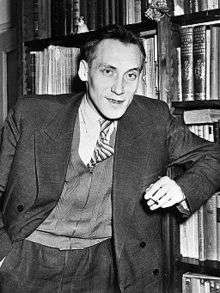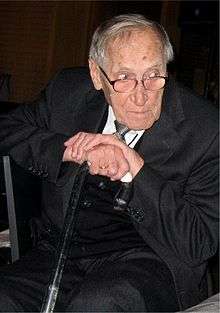Leszek Kołakowski
| Leszek Kołakowski | |
|---|---|
 Kołakowski in 1971 | |
| Born |
23 October 1927 Radom, Poland |
| Died |
17 July 2009 (aged 81) Oxford, England |
| Awards | Jerusalem Prize (2007) |
| Era | 20th / 21st-century philosophy |
| Region | Western Philosophy |
| School | Continental philosophy |
|
Influences
| |
|
Influenced
| |
Leszek Kołakowski (Polish: [ˈlɛʂɛk kɔwaˈkɔfskʲi]; 23 October 1927 – 17 July 2009) was a Polish philosopher and historian of ideas. He is best known for his critical analyses of Marxist thought, especially his three-volume history, Main Currents of Marxism (1976). In his later work, Kolakowski increasingly focused on religious questions. In his 1986 Jefferson Lecture, he asserted that "We learn history not in order to know how to behave or how to succeed, but to know who we are.”[1]
Biography
Kołakowski was born in Radom, Poland. Owing to the German occupation of Poland in World War II, he did not go to school but read books and took occasional private lessons, passing his school-leaving examinations as an external student in the underground school system. After the war, he studied philosophy at Łódź University and in 1953 earned a doctorate from Warsaw University, with a thesis on Spinoza. He was a professor and chairman of Warsaw University's department of the history of philosophy from 1959 to 1968.
In his youth, Kołakowski was a communist. In the period 1947–1966, he was a member of the Polish United Workers' Party. His intellectual promise earned him a trip to Moscow, where he saw the communism in practice and found it repulsive. He broke with Stalinism, becoming a "revisionist Marxist" advocating a humanist interpretation of Marx. One year after the 1956 Polish October, Kołakowski published a four-part critique of Soviet-Marxist dogmas, including historical determinism, in the Polish periodical Nowa Kultura.[2] His public lecture at Warsaw University on the tenth anniversary of Polish October led to his expulsion from the Polish United Workers' Party. In the course of the 1968 Polish political crisis he lost his job at Warsaw University and was prevented from obtaining any other academic post.[3]
He came to the conclusion that the totalitarian cruelty of Stalinism was not an aberration, but instead a logical end product of Marxism, whose genealogy he examined in his monumental Main Currents of Marxism, his major work published in 1976–1978.[4]

Kolakowski became increasingly fascinated by the contribution which theological assumptions make to Western, and, in particular, modern thought. For example, he begins his Main Currents of Marxism with an analysis of the contribution that various forms of mediaeval Platonism made to the Hegelian view of history. Kołakowski defended the role which freedom plays in the human quest for the transcendent. His Law of the Infinite Cornucopia asserts that, for any given doctrine one wants to believe, there is never a shortage of arguments by which one can support it. Nevertheless, although human fallibility implies that we ought to treat claims to infallibility with scepticism, our pursuit of the higher (such as truth and goodness) is ennobling.
In 1968, Kołakowski became a visiting professor in the department of philosophy at McGill University in Montreal and in 1969 he moved to the University of California, Berkeley. In 1970, he became a senior research fellow at All Souls College, Oxford. He remained mostly at Oxford, although he spent part of 1974 at Yale University, and from 1981 to 1994 was a part-time professor at the Committee on Social Thought and in the Department of Philosophy at the University of Chicago.
Although his works were officially banned in Poland, underground copies of them influenced the opinions of the Polish intellectual opposition. His 1971 essay Theses on Hope and Hopelessness (full title : In Stalin's Countries: Theses on Hope and Despair),[5][6] which suggested that self-organized social groups could gradually expand the spheres of civil society in a totalitarian state, helped to inspire the dissident movements of the 1970s that led to Solidarity and, eventually, to the collapse of Communism in Europe in 1989. In the 1980s, Kołakowski supported Solidarity by giving interviews, writing and fund-raising.
In Poland, Kołakowski is not only revered as a philosopher and historian of ideas, but also as an icon for opponents of communism. Adam Michnik has called Kołakowski "one of the most prominent creators of contemporary Polish culture".[7][8]
Kołakowski died on 17 July 2009, aged 81, in Oxford, England.[9] In his obituary, philosopher Roger Scruton said Kolakowski was a "thinker for our time" and that regarding Kolakowski's debates with intellectual opponents, "even if ... nothing remained of the subversive orthodoxies, nobody felt damaged in their ego or defeated in their life's project, by arguments which from any other source would have inspired the greatest indignation."[10]
Awards

In 1986, the National Endowment for the Humanities selected Kołakowski for the Jefferson Lecture. Kołakowski's lecture "The Idolatry of Politics",[11] was reprinted in his collection of essays Modernity on Endless Trial.[12]
In 2003, the Library of Congress named Kołakowski the first winner of the John W. Kluge Prize for Lifetime Achievement in the Humanities.[13][14]
His other awards include the following:
- Jurzykowski Prize (1969)
- Peace Prize of the German Book Trade (1977)
- Veillon Foundation European Prize for the Essay (1980)
- MacArthur Award (1982)
- Erasmus Prize, MacArthur Fellowship (1983)
- Jefferson Lecture for the National Endowment for the Humanities (1986)
- Award of the Polish Pen Club (1988)
- University of Chicago Press, Gordon J. Laing Award (1991)
- Tocqueville Prize (1994)
- Kluge Prize of the Library of Congress (2003)
- St. George Medal (2006)
- Jerusalem Prize (2007)
- Democracy Service Medal (2009)
Bibliography
- Klucz niebieski, albo opowieści budujące z historii świętej zebrane ku pouczeniu i przestrodze (The Key to Heaven), 1957
- 13 bajek z królestwa Lailonii dla dużych i małych (Tales from the Kingdom of Lailonia and the Key to Heaven), 1963. English edition: Hardcover: University of Chicago Press (October 1989). ISBN 978-0-226-45039-1.
- Rozmowy z diablem (US title: Conversations with the Devil / UK title: Talk of the Devil; reissued with The Key to Heaven under the title The Devil and Scripture, 1973), 1965
- Świadomość religijna i więź kościelna, 1965
- Od Hume'a do Koła Wiedeńskiego (the 1st edition:The Alienation of Reason, translated by Norbert Guterman, 1966/ later as Positivist Philosophy from Hume to the Vienna Circle),
- Kultura i fetysze (Toward a Marxist Humanism, translated by Jane Zielonko Peel, and Marxism and Beyond), 1967
- A Leszek Kołakowski Reader, 1971
- Positivist Philosophy, 1971
- TriQuartely 22, 1971
- Obecność mitu (The Presence of Myth), 1972. English edition: Paperback: University of Chicago Press (January 1989). ISBN 978-0-226-45041-4.
- ed. The Socialist Idea, 1974 (with Stuart Hampshire)
- Husserl and the Search for Certitude, 1975
- Główne nurty marksizmu. First published in Polish (3 volumes) as "Główne nurty marksizmu" (Paris: Instytut Literacki, 1976) and in English (3 volumes) as "Main Currents of Marxism" (London: Oxford University Press, 1978). Current editions: Paperback (1 volume): W. W. Norton & Company (17 January 2008). ISBN 978-0393329438. Hardcover (1 volume): W. W. Norton & Company; First edition (7 November 2005). ISBN 978-0393060546.
- Czy diabeł może być zbawiony i 27 innych kazań, 1982
- Religion: If There Is No God, 1982
- Bergson, 1985
- Le Village introuvable, 1986
- Metaphysical Horror, 1988. Revised edition: Paperback: University of Chicago Press (July 2001). ISBN 978-0-226-45055-1.
- Pochwała niekonsekwencji, 1989 (ed. by Zbigniew Menzel)
- Cywilizacja na ławie oskarżonych, 1990 (ed. by Paweł Kłoczowski)
- Modernity on Endless Trial, 1990. Paperback: University of Chicago Press (June 1997). ISBN 978-0-226-45046-9. Hardcover: University of Chicago Press (March 1991). ISBN 978-0-226-45045-2.
- God Owes Us Nothing: A Brief Remark on Pascal's Religion and on the Spirit of Jansenism, 1995. Paperback: University of Chicago Press (May 1998). ISBN 978-0-226-45053-7. Hardcover: University of Chicago Press (November 1995). ISBN 978-0-226-45051-3.
- Freedom, Fame, Lying, and Betrayal: Essays on Everyday Life, 1999
- The Two Eyes of Spinoza and Other Essays on Philosophers, 2004
- My Correct Views on Everything, 2005
- Why Is There Something Rather Than Nothing?, 2007
- Is God Happy?: Selected Essays, 2012
See also
- Adam Schaff
- History of philosophy in Poland
- List of Polish people – philosophy
- Poles in the United Kingdom
- Zygmunt Bauman
References
- ↑ Leszek Kołakowski, "The Idolatry of Politics," reprinted in Modernity on Endless Trial (University of Chicago Press, 1990, paperback edition 1997), ISBN 0-226-45045-7, ISBN 0-226-45046-5, ISBN 978-0-226-45046-9, p. 158.
- ↑ Foreign News: VOICE OF DISSENT, TIME Magazine, 14 October 1957
- ↑ Clive James (2007) Cultural Amnesia, p. 353
- ↑ Gareth Jones (17 July 2009) "Polish philosopher and author Kołakowski dead at 81". Reuters
- ↑ Leszek Kołakowski (1971): Hope and Hopelessness. In: Survey, vol. 17, no. 3 (80)
- ↑ Kołakowski : In Stalin's Countries: Theses on Hope and Despair (1971). osaarchivum.org
- ↑ Adam Michnik (18 July 1985) "Letter from the Gdansk Prison," New York Review of Books.
- ↑ Norman Davies (5 October 1986) "True to Himself and His Homeland," New York Times.
- ↑ Leszek Kolakowski. Encyclopaedia Britannica
- ↑ Scruton, Roger. "Leszek Kolakowski: thinker for our time". opendemocracy.net. Open Democracy. Retrieved 27 February 2015.
- ↑ Jefferson Lecturers. neh.gov
- ↑ Leszek Kołakowski (1990) "The Idolatry of Politics," p. 158 in Modernity on Endless Trial. University of Chicago Press, ISBN 0-226-45045-7.
- ↑ "Library of Congress Announces Winner of First John W. Kluge Prize for Lifetime Achievement in the Humanities and Social Sciences"
- ↑ Leszek Kołakowski, "What the Past is For" (speech given on 5 November 2003, on the occasion of the awarding of the Kluge Prize to Kołakowski).
Further reading
- Azurmendi, Joxe & Arregi, Joseba: Kołakowski, Oñati: EFA, 1972. ISBN 8472400530
External links
| Wikiquote has quotations related to: Leszek Kołakowski |
| Wikimedia Commons has media related to Leszek Kołakowski. |
- Leszek Kołakowski in the Information Processing Centre database (Polish)
- Leszek Kołakowski – Daily Telegraph obituary
- Polish Philosophy Page: Bibliography at the Wayback Machine (archived 10 January 2008)
- Kołakowski, Leszek (1974). "My correct views on everything: A rejoinder to Edward Thompson's 'Open letter to Leszek Kołakowski'". Socialist Register.
- How to Be a Conservative-Liberal-Socialist
- The Alienation of Reason (Extract)
- The Death of Utopia Reconsidered
- The Complete and Brief Metaphysics
- Judt, Tony. "Goodbye to All That?" in The New York Review of Books, Vol. 53, No. 14, 21 September 2006 (review-essay on Main Currents of Marxism: The Founders, the Golden Age, the Breakdown by Leszek Kołakowski, translated from the Polish by P.S. Falla. Norton, 2005, ISBN 0-393-06054-3; My Correct Views on Everything by Leszek Kołakowski, edited by Zbigniew Janowski. St. Augustine's, 2004, ISBN 1-58731-525-4; Karl Marx ou l'esprit du monde by Jacques Attali. Paris: Fayard, 2005, ISBN 2-213-62491-7)
- Roger Kimball, Leszek Kołakowski and the Anatomy of Totalitarianism
- Kołakowski : In Stalin's Countries: Theses on Hope and Despair (1971)
- Good and Evil, 1 April 1999, BBC Radio program In Our Time
- Appearances on C-SPAN
|